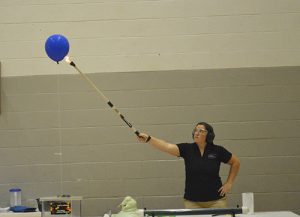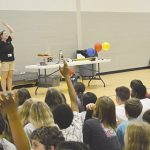
BERLIN – The Maryland Science Center’s Traveling Science Program made its way to Berlin Intermediate School Tuesday, where educators gave students the opportunity to participate in and learn from interactive science experiments.
More than 300 fifth-grade students got to witness explosions, chemical reactions and physical changes in a program that visits schools around Maryland, Northern Virginia, Pennsylvania and Washington, D.C.
Kristen McCown and Kayla DoCouto, educational outreach specialists with the Traveling Science Program, said their roles as both educators and scientists are to garner an interest in STEM (Science, Technology, Math and Engineering) related fields.
“This isn’t a magic show,” DoCouto said. “This is something students can do. They can aspire to do science.”
The assembly program, entitled “What’s the Matter?”, gave students the opportunity to partake in experiments that demonstrated states of matter, phase changes and other science topics.
“There will be a couple of explosions, lots of experiments involving solids, liquids and gases and how they work together,” DoCouto said.
Although the subject matter does not change, McCown said the way in which the duo interacts with the students does.
“Sometimes our language is different,” she said. “With the older kids, we aren’t going to define what matter is. They should already know.”
McCown explained that the assembly’s lively presentation and interactive style is a key component to bolster the students’ interests in science. For example, instead of just explaining what condensation is, the pair uses liquid nitrogen and heated water show it.
“I think good science teaching and good science education is very hands on,” McCown said. “So what we do is we make hands-on activities accessible for students to try and spark their interest, especially going into middle school.”
The Traveling Science Program, DoCouto explained, offers schools an opportunity to remain in a classroom setting, yet have students experience interactive science experiments.
“Rather than load these kids up on a bus, we actually bring the science center to them,” she said.
DoCouto said the program offers a casual and animated approach to science, something students don’t usually find in a traditional classroom setting.
“It’s very informal,” she said. “It’s a presentation of style. So we try to make it fun and exciting while following safety precautions. It’s just different than the classroom.”
McCown agreed.
“When I was a science teacher I did much less exploding than I do now,” she joked.
In 2016, 1,334 students from Worcester County participated in these outreach programs such as the Traveling Science Program, according to the Maryland Science Center.
McCown said it’s particularly beneficial for Worcester County schools, whose students would have to travel more than two hours by bus to utilize the Science Center’s free fieldtrips.
“We are on the road five days a week and we’ll be on Delmarva for most of the week and most of next week too, but after that who knows,” she said.


